- The Moneycessity Newsletter
- Posts
- This is BORING, But It Will Make You a Millionaire In 2025
This is BORING, But It Will Make You a Millionaire In 2025
Investing has become a product where consumers are set up to fail. Fast, frictionless trading and gamification promote investing strategies akin to gambling.

Investing has become too… fun.
Gamification is costing new investors in ways that they don’t even realize.
Watch the extended version HERE.
What Makes Robinhood Different?
Investing used to be complicated. Platforms like Vanguard and TD Ameritrade were packed with charts, jargon, and so much information it felt overwhelming. It slowed people down but forced them to learn before making decisions, which helped avoid mistakes.
Robinhood changed everything. The app is simple and flashy, showing just the ticker, a red or green line, and the price. No fees mean investing small amounts feels practical — back in the day, a $15 fee on a $100 trade instantly wiped out 15%. Robinhood also offers instant trading with no waiting, plus free stocks if you invite friends. It’s fast, fun, and frictionless.
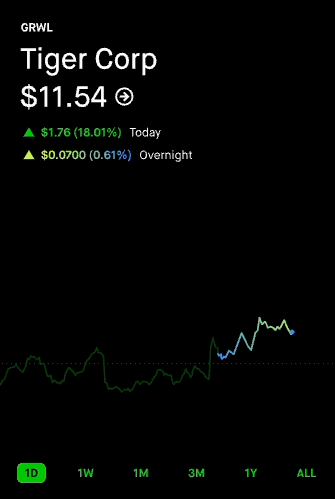
Robinhood App Screenshot
But this ease has downsides. No fees remove a key roadblock, making it easy to overtrade, which often leads to losses. Frequent trading is bad for three reasons:
Capital Gains — Profitable trades get hit with taxes.
Hidden Costs — No upfront fees, but Robinhood makes money through payment for order flow. They send your trades to market makers who pay them, but these deals might not get you the best price.
Less Thoughtful Decisions — No fees mean less hesitation. Before, a $15 fee stopped impulsive trades. Now, you can buy, sell, and buy again without much thought, but that can hurt your portfolio over time.
Robinhood profits when you trade more, so the app is built to encourage constant transactions. It’s fast and fun, but investing is about patience and smart decisions, not impulsive moves.
How Does Robinhood Make Money?
Every time you trade on Robinhood, your order goes to a market maker, not Robinhood itself. Market makers handle the trades, make money from them, and pay Robinhood a rebate for sending business their way.
Market makers act as middlemen. They take large orders and break them into smaller ones or combine small orders into larger trades. Their job is to ensure buyers and sellers can trade instantly by providing liquidity — keeping the market moving.
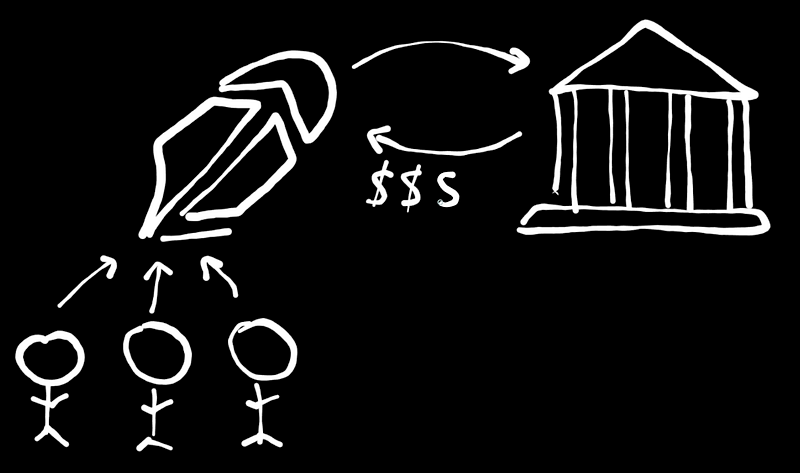
Market Maker Illustration by author
Market makers get paid through the bid-ask spread. If a stock is worth $100, they might sell it to you for $100.01 or buy it from you for $99.99. That tiny 2-cent difference is their profit. Riskier, more volatile stocks often have bigger spreads because they’re harder to trade, which means market makers earn more.
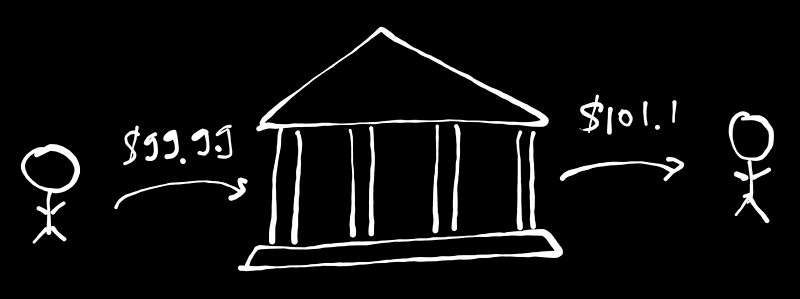
Bid-Ask Spread Illustration by author
Robinhood profits from this system through rebates. The more trades you make — and especially if you trade risky stocks with larger spreads — the more money market makers and Robinhood make. This setup encourages frequent trading, which can cost you more in the long run.
It’s not just apps like Robinhood affecting new investors — pandemic-era investing culture has added fuel to the fire. During lockdowns, people had extra cash from saving on activities and stimulus checks. With money burning a hole in their accounts, many turned to online investing communities like Reddit’s Wall Street Bets.
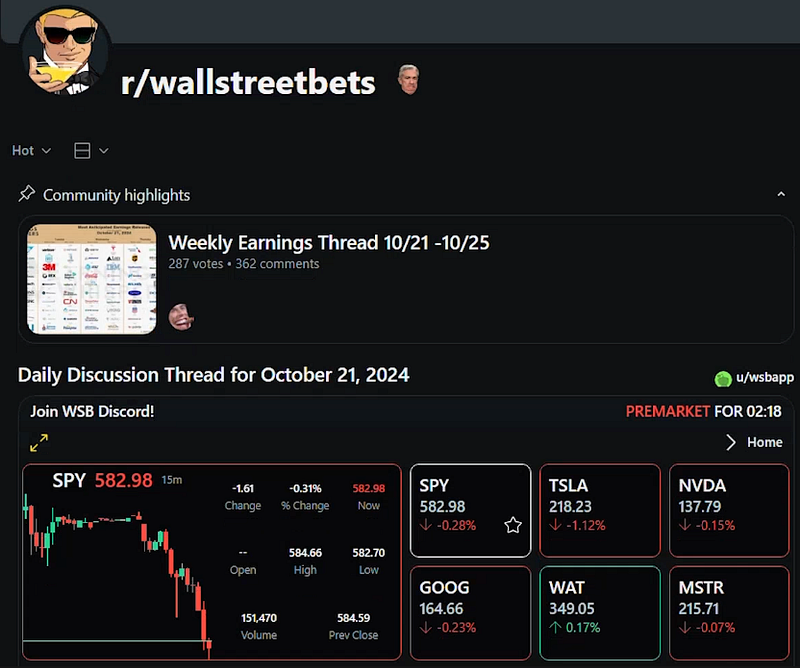
Wallstreet Bets Screenshot
Wall Street Bets is a total circus. Memes everywhere, wild stories of people striking it rich or losing everything — it’s emotional, unpredictable, and honestly pretty addictive. Compare that to something like Bogleheads, which feels like a boring lecture with a ton of links and no fun.
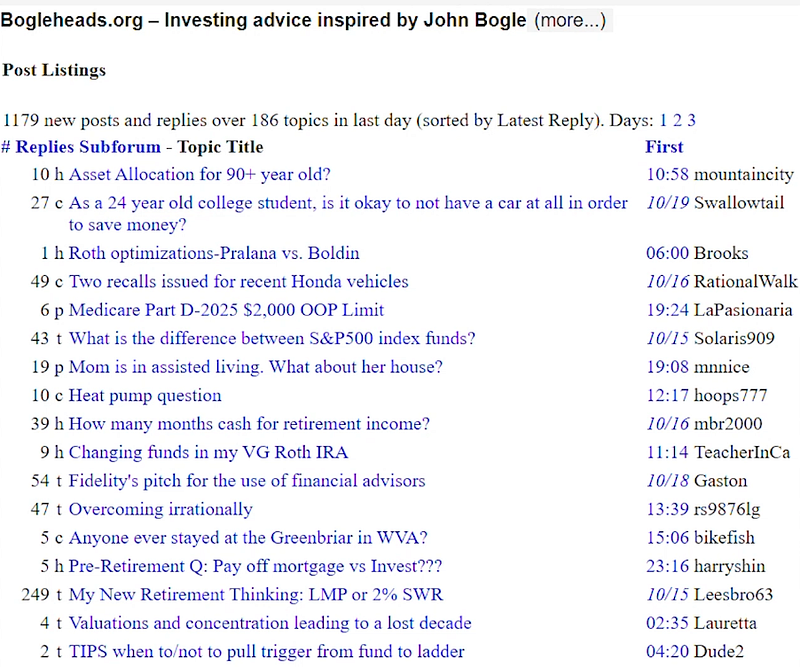
Boggleheads Screenshot
The problem? Wall Street Bets makes high-risk trading look like gambling, turning investing into a game instead of a smart, long-term plan. It’s fun to watch, but if you follow the hype, it could cost you big.
Why You Should Be Boring?
Investing has turned into a game for a lot of people, and in a culture where it’s treated like sports betting, staying responsible with your money can feel boring. But boring is often the smartest move.
According to The Intelligent Investor — a classic loved by legends like Warren Buffett — you should either go all-in on research or keep it completely passive. Anything in the middle is a losing strategy.

Investor Continuum Illustration by author
If you don’t want to spend hours studying companies, you’re better off sticking to passive index funds or ETFs. They’re low effort and statistically deliver solid results. If you do want to beat the market, active investing takes serious work — digging into income statements, balance sheets, cash flows, and understanding a company’s future, competition, and economic environment. It’s not flashy, but it’s how you win.
To save me some time, I made an automated spreadsheet tool that helps me calculate the intrinsic value of a company. Check it out HERE.
Catch you on the flip side.

Reply